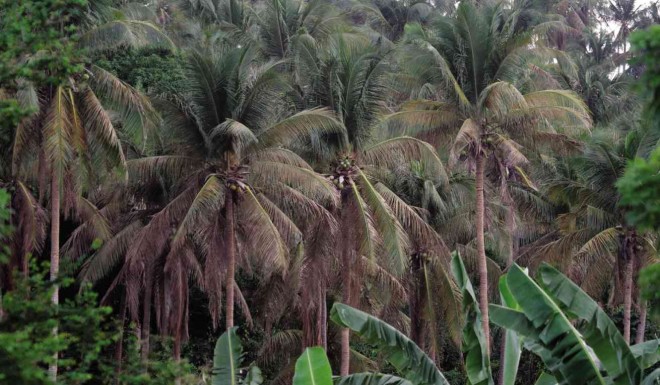Pangilinan: Coco levy won’t be used in war vs pest

COCONUT trees leaves gradually turn brown due to insect infestation in a farm in Batangas province. EDWIN BACASMAS
LUCENA CITY, Philippines—Presidential Assistant for Food Security and Agricultural Modernization Francis Pangilinan declared here on Tuesday that no portion of the multibillion-peso coconut levy fund would be used in the government’s war against the coconut scale insect pest that has been affecting more than a million coconut trees nationwide.
“There is no need yet to use the coco levy fund because the Philippine Coconut Authority (PCA) has enough funds at present,” Pangilinan said.
Pangilinan made the remarks on the sidelines of a consultation assembly on the coconut pest, referred to also as “cocolisap,” held at Kalilayan Hall here.
He said he wanted to use the coconut levy fund for clear programs that would give “direct benefits” to the farmers.
Pangilinan said the coco levy fund “remained intact.”
During the open forum held earlier, a Quezon town mayor appealed to the national government to use the recovered coco levy fund, estimated at P71 billion, in the fight against the pests. Quezon farmers are believed the biggest contributors to the coco levy fund exacted from 1973 to 1982 during the regime of dictator Ferdinand Marcos.
Emergency measures
On Monday, the national government unveiled a six-month emergency measure to address the pest and allotted P750 million to contain the pests, affecting 1.2 million trees nationwide.
Interior Secretary Mar Roxas, who joined Pangilinan here, said the P750 million came from the President’s Social Fund.
During the six-month program, the authorities would conduct pruning and burning of drying trees, trunk injection, spraying of organic and commercial pesticides, release of bio-control agents and fertilization of affected trees.
Roxas warned that all coconut farm owners should open their land to the treatment measures offered by authorities under pain of imprisonment.
Some landowners in central Quezon were taking advantage of the pest infestation, using it as an excuse to evict their tenants by allowing the insects to devour their trees.
Pangilinan said that starting June 20, the PCA would mobilize all local officials and farmers in treating 6,000 coconut trees a day in Quezon.
He said the fund would be given to local officials but said they would have to account for the actual number of treated trees. The affected coconut farmers, who would serve as the workforce in the massive and synchronized treatment of the infested trees, would be paid for their efforts, he added.
Roberto Gajo, Quezon chief agriculturist, said as of June 10, nearly half a million coconut trees (435,710) in different parts of the province were infected with cocolisap.
Antonio Flores, secretary general of Kilusang Magbubukid ng Pilipinas (KMP) welcomed Pangilinan’s declaration not to use the coco levy fund against the pests, but he urged direct distribution of the coco levy fund to the farmers.
Quezon Gov. David Suarez also welcomed Pangilinan’s move. He noted the participation of the Alcala clan, a political rival, in the consultation assembly. The Alcala delegation was headed by Rep. Vicente Alcala, his nephews Lucena Mayor Roderick Alcala and former Rep. Irvin Alcala, son of Agriculture Secretary Proceso Alcala, who opposed but lost against Suarez in the last election.
Rep. Aleta Suarez and the representatives of Rep. Mark Enverga and Rep. Helen Tan, municipal mayors, municipal agriculturists, PCA officials and farmers’ representatives also attended the assembly.














